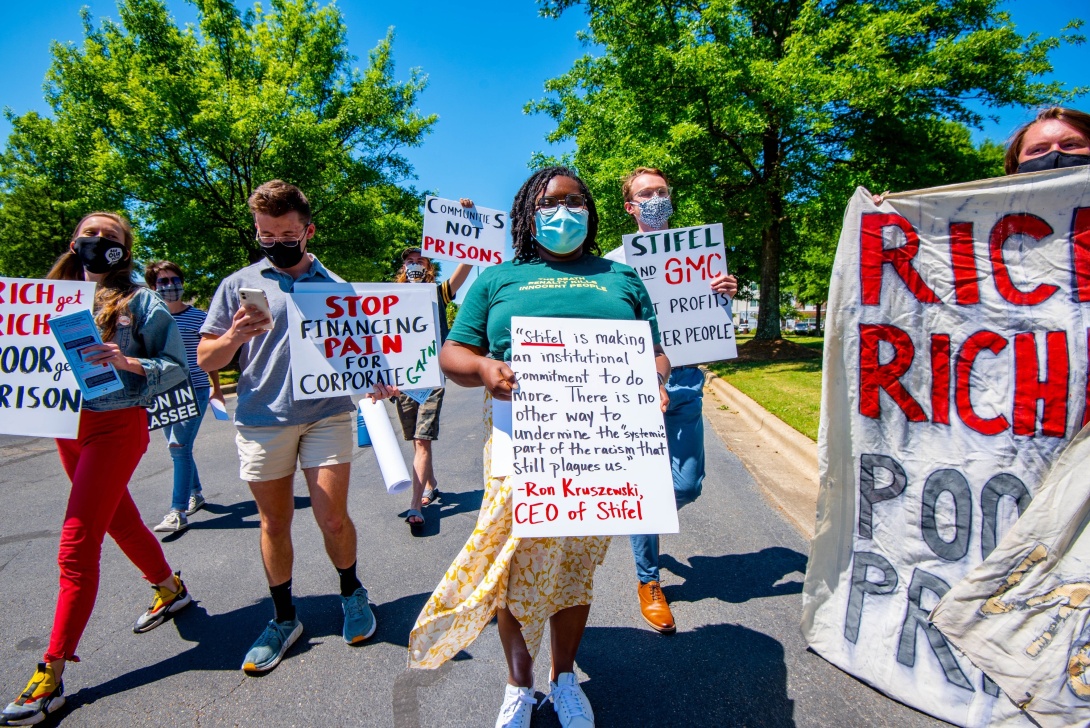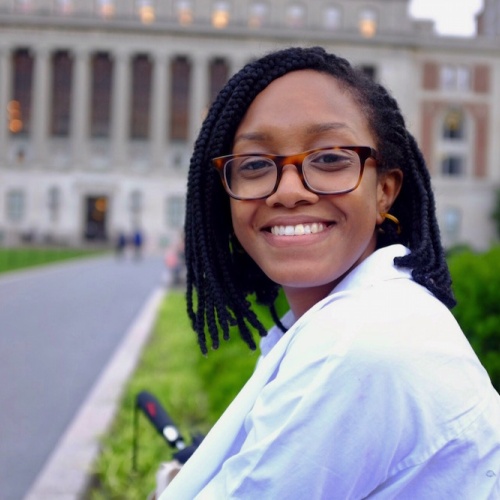How Alabama organizers blocked Gov. Ivey's prison lease plan

Activists with the coalition Communities Not Prisons held a rally against Alabama Gov. Kay Ivey's prison lease plan in Montgomery, the state capital. (Photo courtesy of Alabama Appleseed.)
A coalition of Alabama organizations called Communities Not Prisons is celebrating the collapse of a plan proposed by Gov. Kay Ivey (R) to increase the state's prison capacity by working with private prison companies to build three new facilities in the state and leasing them for 30 years.
The state formulated the plan to build new prisons after a 2019 United States Department of Justice report and subsequent December 2020 lawsuit detailing horrific and unconstitutional conditions in the state's men's prisons — fatal prisoner-on-prisoner violence, excessive force by security staff, sexual abuse, unsanitary conditions, and overcrowding. This February, Ivey signed a lease agreement with Nashville, Tennessee-based CoreCivic for private prisons in Atmore and Tallassee, and she had been in negotiations with Alabama Prison Transformation Partners, a group of companies that includes Birmingham-based BL Harbert International, to build a prison in Brierfield.
Communities Not Prisons rejects Ivey's claim that the way to improve Alabama's prisons is to build new ones. And at the Republican-controlled state legislature, the lease plan came under bipartisan criticism for its lack of transparency. But the deal, in which CoreCivic would build two prisons and lease them to the state for 30 years, ultimately collapsed after Communities Not Prisons pressured two of the banks involved in the deal — Barclays of London and KeyBanc Capital Markets, a subsidiary of Cleveland-based KeyBank — to back out.
It's unclear where the potential of new prison construction stands. The state missed its June 1 deadline to secure financing for the project. In a statement to Facing South, Ivey's press secretary Gina Maiola said:
Governor Ivey remains committed to solving the challenges facing Alabama's corrections system. As she has done since taking up this issue in 2017, she is staying engaged with members of the Alabama Legislature to determine our next steps. Governor Ivey has stressed that this is a multifaceted problem requiring a multifaceted solution. Improving the infrastructure is a vital step, and she plans to continue taking steps to make smart reforms to criminal justice.
Some state legislators have said that a bond issue to finance state-owned prisons could be an option. The Alabama Department of Corrections and three developers involved in the deal — CoreCivic, Star America Infrastructure Partners of New York, and BL Harbert International — did not respond to requests for comment.
"They think the way is to build their way out, and that's just not the way," said LaTonya Tate, a former parole officer who now serves as the CEO and executive director of the Alabama Justice Initiative, which launched Communities Not Prisons last year in response to Ivey's plan. "If we continue to put lipstick on a pig, we're going to continue to have the same problem."
Learning about coalitions
Communities Not Prisons is a case study in single-issue organizing across lines of race, class, and geography. The coalition partners ranged from groups like Black-led The Ordinary People's Society (TOPS), which has been organizing against mass incarceration in Alabama since 2001; to Alabama Students Against Prisons, a youth-led group that formed last year; to hyperlocal rural organizations where opposition to the prison plan was not initially based on concerns about mass incarceration but that a prison would be in their backyard.
Bringing these partners together took difficult conversations and a lot of planning, as coalition members told Facing South. It involved hours of meetings to build trust, discuss tactics, and establish a democratic method of deciding how the coalition would present itself to the public.
"We had to go through all the schematics and logistics of being a coalition," said Pastor Kenny Glasgow, the president and founder of TOPS. "You're dealing with people that have never been in a coalition. First of all, we had to get the standards and principles of how you act as a coalition. The second thing you want to do is build a united front, meaning that you will take turns leading — meaning everyone will find their lane and stay there."
Prison opponents also mobilized people by creating Facebook groups that became part of the coalition. Jackson McNeely is an art teacher who runs a frame shop near Brierfield, an unincorporated community in Bibb County; she created the Block the Brierfield Prison group on Facebook last September after a friend told her about the governor's plan. She has environmental concerns about putting such a large facility in a rural community that's dependent on groundwater for drinking and where there is no waste treatment facility.
"It seems remarkable to me. This extremely unusual coalition came together and thwarted the largest banks in the world from our couches in Alabama during the pandemic."
"And of course then it was a lot of coconut telegraph — residents picking up the phone calling neighbors, 'Have you sold your property? Whose property is this? Where is it?'" McNeely said. "And it didn't take us long to really establish where the proposed prison site was."
The Brierfield Facebook group now has over a thousand members. "The cool thing about all of this is nobody cares what political affiliation you have," she said. "Everybody is fighting together, and I think that is so rare, especially right now in the United States."
They've been working closely with people involved in another Facebook group, No Prison for Tallassee, founded by Leslie Ogburn, who runs a tree farm in the small city of 5,000 and whose small business and home are near the proposed prison site. Ogburn and Glasgow of TOPS were among the plaintiffs who sued Ivey and the state corrections department in April, seeking to block the prison plan by questioning its state constitutionality, according to the Alabama Political Reporter. A judge dismissed the lawsuit last month, but Ogburn told Facing South she and the plaintiffs are still discussing their legal options.
Rather than investing money in new prison buildings, Ogburn said, it "should be invested back into communities to give children a start on the right track before it gets to a point where a prison is needed."
Throughout the winter and spring, members of the coalition attended town halls in the communities where the prisons would be built and rallied against the plan at the state capitol in Montgomery. Though the prison-building plan is stalled, the coalition plans to continue to protest and hold town halls about the issue this summer, said Tate of the Alabama Justice Initiative.
Pressure on key banks
The coalition also successfully targeted the plan's private backers. For months, Communities Not Prisons had struggled to find a narrative foothold because so little information about Ivey's plan was publicly available. But then this spring, one of the prison plan's opponents happened upon a CoreCivic PowerPoint that had been uploaded to a public website. Targeted at potential investors in the private prison project, the document included more detail about the proposed prisons than had been made available to Alabama legislators or people living in the communities where the prisons would have been built, prison opponents said.
It also included the names, phone numbers, and email addresses of contacts leading the project at each of three banks involved in underwriting it — Barclays, KeyBank, and Stifel. That presented an opportunity for the coalition, which sent them thousands of emails and phone messages, said Dana Sweeney, an organizer with the nonprofit Alabama Appleseed Center for Law and Justice, an original member of Communities Not Prisons.
The coalition focused in particular on Barclays, the lead underwriter, because the bank had issued a statement in 2019 saying it would no longer finance private prisons. It had previously worked with Florida-based for-profit prison company Geo Group, a partnership that dated back to 2001.
Amid the uproar over Barclays' involvement in the Alabama prisons plan, the American Sustainable Business Council (ASBC) and the Social Venture Circle — business groups that advocate for social justice and sustainability — announced they would refund the bank's dues and terminate its membership.
"We abhor the hypocrisy represented here and renounce the continued investment in the broken, unjust system of incarceration of this country," MaryAnne Howland, the ASBC's board chair, said in a statement.
Three days later, on April 19, Barclays pulled out of the deal. KeyBank followed soon after. In May, Stifel pulled out too. With the loss of its three primary underwriters, the lease plan collapsed.
"It seems remarkable to me," said Sweeney. "This extremely unusual coalition came together and thwarted the largest banks in the world from our couches in Alabama during the pandemic."
Organizing across divides
For the coalition partners with organizing experience, the work of coalition-building with single-issue groups — many of them in largely white rural communities in some of the most conservative parts of Alabama — presented an opportunity to build the power necessary to fundamentally change Alabama's criminal justice system.
And it worked. Now some of the coalition partners who became involved to fight against prisons in their own community see themselves as part of a bigger movement.
Organizing against the prison plan was the first encounter some people in the coalition had with the DOJ report, Sweeney said. The report's findings are common knowledge in the state's activist circles, but not necessarily for other Alabamians. Building a broad coalition to fight against the plan allowed organizations like Appleseed, Alabama Justice Initiative, and TOPS to conduct popular education about prison conditions, the DOJ lawsuit, and the high rate of mass incarceration in Alabama, which ranks 17th in the nation for locking people up, according to the Sentencing Project.
"Since becoming active in this and learning so much more about the corruption and the horrible situation in the Alabama justice system, it has changed for me and become more a fight about people's rights and communities," said Ogburn of No Prison in Tallassee. "Not just Tallassee — everybody."
The bipartisan and urban-rural composition of the coalition was key to its success, several coalition members said.
"Rural folks in this state, most of them have never had somebody knock on their door and ask them what they think about the world," said Sweeney of the Appleseed Center. "I think it created an opportunity for us to be the first people to ask people what they think."
He thinks the success of this coalition could provide a model for coalition-building around similar issues in Alabama or elsewhere across the South. Glasgow, the pastor with TOPS, agrees. He said that the continued legacy of racism and Jim Crow in the South — combined with the domination of state politics by conservative forces — means that bipartisan, multiracial coalitions are often necessary to move the needle on policy.
"When you've got rural white communities that don't want these prisons, you've got Black activists that don't want these prisons, you've got the DOJ coming with their lawsuits because of the inhumanity, that's a movement," he said. "That's why it worked more so now than ever, because we've got all this diversity, all these communities engaged in it."
Tags
Olivia Paschal
Olivia Paschal is the archives editor with Facing South and a Ph.D candidate in history at the University of Virginia. She was a staff reporter with Facing South for two years and spearheaded Poultry and Pandemic, Facing South's year-long investigation into conditions for Southern poultry workers during the COVID-19 pandemic. She also led the Institute's project to digitize the Southern Exposure archive.
Elisha Brown
Elisha Brown is a staff writer at Facing South and a former Julian Bond Fellow. She previously worked as a news assistant at The New York Times, and her reporting has appeared in The Daily Beast, The Atlantic, and Vox.

